Hello,
I use NRF52832 and nRF5_SDK_15.2.0 for our custom board.
Also, FreeRTOS(Tickless IDLE is enabled) is used. And, System ON mode is used for sleep mode.
Now, I am testing sleep mode. But sleep current is higher than I expected.
Average Current is 500~600uA when device is sleep mode when System ON mode.
I checked System OFF mode also. When device is system OFF mode, average current is 50uA.
I brought some clean up code(GPIO, Peripheral) from System OFF mode test.
So, It is supposed that CPU consumes most of current consumption.
I searched in nordic community. And I gave some modification based on FreeRTOS suggestion
For reference, I also uploaded port_cmsis_systick.c file which is using currently.
/*
* FreeRTOS Kernel V10.0.0
* Copyright (C) 2017 Amazon.com, Inc. or its affiliates. All Rights Reserved.
*
* Permission is hereby granted, free of charge, to any person obtaining a copy of
* this software and associated documentation files (the "Software"), to deal in
* the Software without restriction, including without limitation the rights to
* use, copy, modify, merge, publish, distribute, sublicense, and/or sell copies of
* the Software, and to permit persons to whom the Software is furnished to do so,
* subject to the following conditions:
*
* The above copyright notice and this permission notice shall be included in all
* copies or substantial portions of the Software. If you wish to use our Amazon
* FreeRTOS name, please do so in a fair use way that does not cause confusion.
*
* THE SOFTWARE IS PROVIDED "AS IS", WITHOUT WARRANTY OF ANY KIND, EXPRESS OR
* IMPLIED, INCLUDING BUT NOT LIMITED TO THE WARRANTIES OF MERCHANTABILITY, FITNESS
* FOR A PARTICULAR PURPOSE AND NONINFRINGEMENT. IN NO EVENT SHALL THE AUTHORS OR
* COPYRIGHT HOLDERS BE LIABLE FOR ANY CLAIM, DAMAGES OR OTHER LIABILITY, WHETHER
* IN AN ACTION OF CONTRACT, TORT OR OTHERWISE, ARISING FROM, OUT OF OR IN
* CONNECTION WITH THE SOFTWARE OR THE USE OR OTHER DEALINGS IN THE SOFTWARE.
*
* http://www.FreeRTOS.org
* http://aws.amazon.com/freertos
*
* 1 tab == 4 spaces!
*/
/* Scheduler includes. */
#include "FreeRTOS.h"
#include "task.h"
#include "app_util.h"
#ifdef SOFTDEVICE_PRESENT
#include "nrf_soc.h"
#include "nrf_sdh.h"
#include "app_error.h"
#include "app_util_platform.h"
#endif
/*-----------------------------------------------------------
* Implementation of functions defined in portable.h for the ARM CM4F port.
* CMSIS compatible layer to menage SysTick ticking source.
*----------------------------------------------------------*/
#if configTICK_SOURCE == FREERTOS_USE_SYSTICK
#ifndef configSYSTICK_CLOCK_HZ
#define configSYSTICK_CLOCK_HZ configCPU_CLOCK_HZ
/* Ensure the SysTick is clocked at the same frequency as the core. */
#define portNVIC_SYSTICK_CLK_BIT ( SysTick_CTRL_CLKSOURCE_Msk )
#else
/* The way the SysTick is clocked is not modified in case it is not the same
as the core. */
#define portNVIC_SYSTICK_CLK_BIT ( 0 )
#endif
#if configUSE_TICKLESS_IDLE == 1
#error SysTick port for RF52 does not support tickless idle. Use RTC mode instead.
#endif /* configUSE_TICKLESS_IDLE */
/*-----------------------------------------------------------*/
void xPortSysTickHandler( void )
{
/* The SysTick runs at the lowest interrupt priority, so when this interrupt
executes all interrupts must be unmasked. There is therefore no need to
save and then restore the interrupt mask value as its value is already
known. */
( void ) portSET_INTERRUPT_MASK_FROM_ISR();
{
/* Increment the RTOS tick. */
if ( xTaskIncrementTick() != pdFALSE )
{
/* A context switch is required. Context switching is performed in
the PendSV interrupt. Pend the PendSV interrupt. */
SCB->ICSR = SCB_ICSR_PENDSVSET_Msk;
__SEV();
}
}
portCLEAR_INTERRUPT_MASK_FROM_ISR( 0 );
}
/*-----------------------------------------------------------*/
/*
* Setup the systick timer to generate the tick interrupts at the required
* frequency.
*/
void vPortSetupTimerInterrupt( void )
{
/* Set interrupt priority */
NVIC_SetPriority(SysTick_IRQn, configKERNEL_INTERRUPT_PRIORITY);
/* Configure SysTick to interrupt at the requested rate. */
SysTick->LOAD = ROUNDED_DIV(configSYSTICK_CLOCK_HZ, configTICK_RATE_HZ) - 1UL;
SysTick->CTRL = ( portNVIC_SYSTICK_CLK_BIT | SysTick_CTRL_TICKINT_Msk | SysTick_CTRL_ENABLE_Msk );
}
/*-----------------------------------------------------------*/
#elif configTICK_SOURCE == FREERTOS_USE_RTC
#if configUSE_16_BIT_TICKS == 1
#error This port does not support 16 bit ticks.
#endif
#include "nrf_rtc.h"
#include "nrf_drv_clock.h"
/*-----------------------------------------------------------*/
void xPortSysTickHandler( void )
{
#if configUSE_TICKLESS_IDLE == 1
nrf_rtc_event_clear(portNRF_RTC_REG, NRF_RTC_EVENT_COMPARE_0);
#endif
BaseType_t switch_req = pdFALSE;
uint32_t isrstate = portSET_INTERRUPT_MASK_FROM_ISR();
uint32_t systick_counter = nrf_rtc_counter_get(portNRF_RTC_REG);
nrf_rtc_event_clear(portNRF_RTC_REG, NRF_RTC_EVENT_TICK);
if (configUSE_DISABLE_TICK_AUTO_CORRECTION_DEBUG == 0)
{
/* check FreeRTOSConfig.h file for more details on configUSE_DISABLE_TICK_AUTO_CORRECTION_DEBUG */
TickType_t diff;
diff = (systick_counter - xTaskGetTickCount()) & portNRF_RTC_MAXTICKS;
/* At most 1 step if scheduler is suspended - the xTaskIncrementTick
* would return the tick state from the moment when suspend function was called. */
if ((diff > 1) && (xTaskGetSchedulerState() != taskSCHEDULER_RUNNING))
{
diff = 1;
}
while ((diff--) > 0)
{
switch_req |= xTaskIncrementTick();
}
}
else
{
switch_req = xTaskIncrementTick();
}
/* Increment the RTOS tick as usual which checks if there is a need for rescheduling */
if ( switch_req != pdFALSE )
{
/* A context switch is required. Context switching is performed in
the PendSV interrupt. Pend the PendSV interrupt. */
SCB->ICSR = SCB_ICSR_PENDSVSET_Msk;
__SEV();
}
portCLEAR_INTERRUPT_MASK_FROM_ISR( isrstate );
}
/*
* Setup the RTC time to generate the tick interrupts at the required
* frequency.
*/
void vPortSetupTimerInterrupt( void )
{
/* Request LF clock */
nrf_drv_clock_lfclk_request(NULL);
/* Configure SysTick to interrupt at the requested rate. */
nrf_rtc_prescaler_set(portNRF_RTC_REG, portNRF_RTC_PRESCALER);
nrf_rtc_int_enable (portNRF_RTC_REG, RTC_INTENSET_TICK_Msk);
nrf_rtc_task_trigger (portNRF_RTC_REG, NRF_RTC_TASK_CLEAR);
nrf_rtc_task_trigger (portNRF_RTC_REG, NRF_RTC_TASK_START);
nrf_rtc_event_enable(portNRF_RTC_REG, RTC_EVTEN_OVRFLW_Msk);
NVIC_SetPriority(portNRF_RTC_IRQn, configKERNEL_INTERRUPT_PRIORITY);
NVIC_EnableIRQ(portNRF_RTC_IRQn);
}
#if configUSE_TICKLESS_IDLE == 1
#if 1
#define PWR_MGMT_FPU_SLEEP_PREPARE() pwr_mgmt_fpu_sleep_prepare()
__STATIC_INLINE void pwr_mgmt_fpu_sleep_prepare(void)
{
uint32_t original_fpscr;
CRITICAL_REGION_ENTER();
original_fpscr = __get_FPSCR();
/*
* Clear FPU exceptions.
* Without this step, the FPU interrupt is marked as pending,
* preventing system from sleeping. Exceptions cleared:
* - IOC - Invalid Operation cumulative exception bit.
* - DZC - Division by Zero cumulative exception bit.
* - OFC - Overflow cumulative exception bit.
* - UFC - Underflow cumulative exception bit.
* - IXC - Inexact cumulative exception bit.
* - IDC - Input Denormal cumulative exception bit.
*/
__set_FPSCR(original_fpscr & ~0x9Fu);
(void) __get_FPSCR();
__DMB();
NVIC_ClearPendingIRQ(FPU_IRQn);
CRITICAL_REGION_EXIT();
/*
* The last chance to indicate an error in FPU to the user
* as the FPSCR is now cleared
*
* This assert is related to previous FPU operations
* and not power management.
*
* Critical FPU exceptions signaled:
* - IOC - Invalid Operation cumulative exception bit.
* - DZC - Division by Zero cumulative exception bit.
* - OFC - Overflow cumulative exception bit.
*/
ASSERT((original_fpscr & 0x7) == 0);
}
#endif
#include "nrf_drv_gpiote.h"
void vPortSuppressTicksAndSleep( TickType_t xExpectedIdleTime )
{
/*
* Implementation note:
*
* To help debugging the option configUSE_TICKLESS_IDLE_SIMPLE_DEBUG was presented.
* This option would make sure that even if program execution was stopped inside
* this function no more than expected number of ticks would be skipped.
*
* Normally RTC works all the time even if firmware execution was stopped
* and that may lead to skipping too much of ticks.
*/
TickType_t enterTime;
/* Make sure the SysTick reload value does not overflow the counter. */
if ( xExpectedIdleTime > portNRF_RTC_MAXTICKS - configEXPECTED_IDLE_TIME_BEFORE_SLEEP )
{
xExpectedIdleTime = portNRF_RTC_MAXTICKS - configEXPECTED_IDLE_TIME_BEFORE_SLEEP;
}
/* Block all the interrupts globally */
#ifdef SOFTDEVICE_PRESENT
do{
uint8_t dummy = 0;
uint32_t err_code = sd_nvic_critical_region_enter(&dummy);
APP_ERROR_CHECK(err_code);
}while (0);
#else
__disable_irq();
#endif
enterTime = nrf_rtc_counter_get(portNRF_RTC_REG);
if ( eTaskConfirmSleepModeStatus() != eAbortSleep )
{
TickType_t xModifiableIdleTime;
TickType_t wakeupTime = (enterTime + xExpectedIdleTime) & portNRF_RTC_MAXTICKS;
/* Stop tick events */
nrf_rtc_int_disable(portNRF_RTC_REG, NRF_RTC_INT_TICK_MASK);
/* Configure CTC interrupt */
nrf_rtc_cc_set(portNRF_RTC_REG, 0, wakeupTime);
nrf_rtc_event_clear(portNRF_RTC_REG, NRF_RTC_EVENT_COMPARE_0);
nrf_rtc_int_enable(portNRF_RTC_REG, NRF_RTC_INT_COMPARE0_MASK);
__DSB();
/* Sleep until something happens. configPRE_SLEEP_PROCESSING() can
* set its parameter to 0 to indicate that its implementation contains
* its own wait for interrupt or wait for event instruction, and so wfi
* should not be executed again. However, the original expected idle
* time variable must remain unmodified, so a copy is taken. */
xModifiableIdleTime = xExpectedIdleTime;
configPRE_SLEEP_PROCESSING( xModifiableIdleTime );
nrf_gpio_pin_set(10);
if ( xModifiableIdleTime > 0 )
{
PWR_MGMT_FPU_SLEEP_PREPARE();
#if 0 // With FreeRTOS sd_app_evt_wait increases power consumption with FreeRTOS compared to _WFE (NRFFOSDK-11174)
#ifdef SOFTDEVICE_PRESENT
if (nrf_sdh_is_enabled())
{
nrf_gpio_pin_set(24);
uint32_t err_code = sd_app_evt_wait();
APP_ERROR_CHECK(err_code);
nrf_gpio_pin_clear(24);
}
else
#endif
#endif // (NRFFOSDK-11174)
{
/* No SD - we would just block interrupts globally.
* BASEPRI cannot be used for that because it would prevent WFE from wake up.
*/
do{
nrf_gpio_pin_set(24);
__WFE();
nrf_gpio_pin_clear(24);
} while (0 == (NVIC->ISPR[0] | NVIC->ISPR[1]));
}
}
configPOST_SLEEP_PROCESSING( xExpectedIdleTime );
nrf_gpio_pin_clear(10);
nrf_rtc_int_disable(portNRF_RTC_REG, NRF_RTC_INT_COMPARE0_MASK);
nrf_rtc_event_clear(portNRF_RTC_REG, NRF_RTC_EVENT_COMPARE_0);
/* Correct the system ticks */
{
TickType_t diff;
TickType_t exitTime;
nrf_rtc_event_clear(portNRF_RTC_REG, NRF_RTC_EVENT_TICK);
nrf_rtc_int_enable (portNRF_RTC_REG, NRF_RTC_INT_TICK_MASK);
exitTime = nrf_rtc_counter_get(portNRF_RTC_REG);
diff = (exitTime - enterTime) & portNRF_RTC_MAXTICKS;
/* It is important that we clear pending here so that our corrections are latest and in sync with tick_interrupt handler */
NVIC_ClearPendingIRQ(portNRF_RTC_IRQn);
if ((configUSE_TICKLESS_IDLE_SIMPLE_DEBUG) && (diff > xExpectedIdleTime))
{
diff = xExpectedIdleTime;
}
if (diff > 0)
{
vTaskStepTick(diff);
}
}
}
#ifdef SOFTDEVICE_PRESENT
uint32_t err_code = sd_nvic_critical_region_exit(0);
APP_ERROR_CHECK(err_code);
#else
__enable_irq();
#endif
}
#endif // configUSE_TICKLESS_IDLE
#else // configTICK_SOURCE
#error Unsupported configTICK_SOURCE value
#endif // configTICK_SOURCE == FREERTOS_USE_SYSTICK
I checked __WFE() part in port_cmsis_systick.c with two GPIOs to check CPU is sleep or not.
As you can see the code, I used Pin 10, Pin 24. When device is sleep mode, Pin 10(Yellow signal in image below)
is not changed which means OS is in sleep mode. But Pin 24( Red signal in image below) is kept changing(It occured about 48ms) by another interrupt.
I guess it caused by soft device. Because softdevice use RTC and Timer.

Is My guessing correct?
Do I need to do something to make soft device sleep? or Do I miss something?
Additionally, I also checked sd_app_evt_wait() part in port_cmsis_systick.c.
As you can see, Two GPIOs are not changed when enter IDLE mode. Also, Current consumption is same as test above.
It supposed that same situation is occurred in inside of softdevice.

Please give me any help.
Thanks
Chongchun Moon


